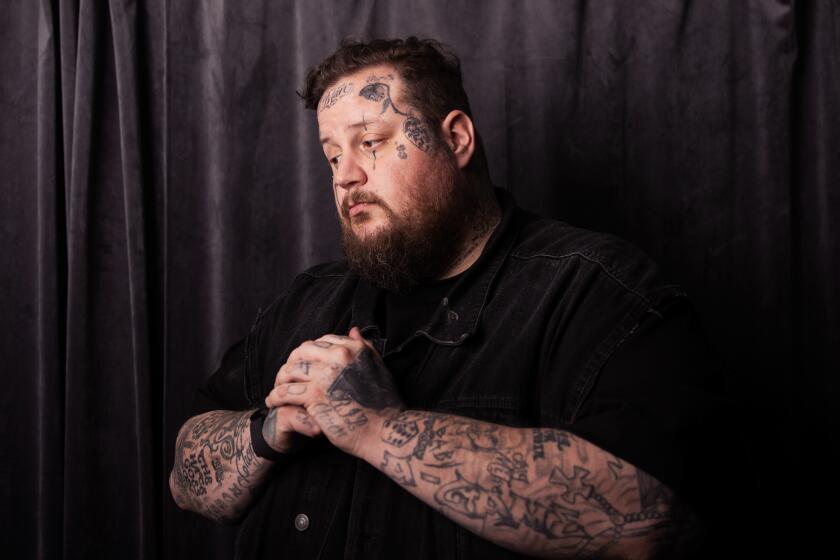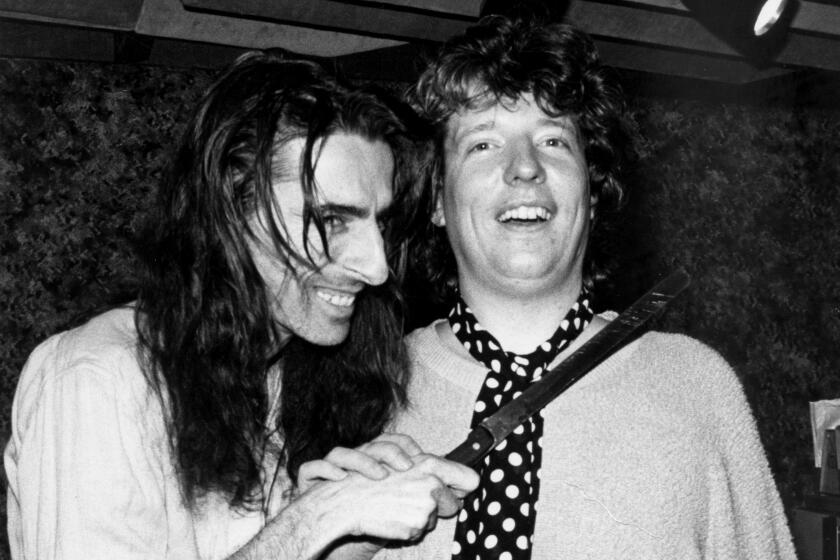FACES : SHE’S NIGERIAN, BRITISH, SLINKY . . . AND SULTRY
- Share via
Sade (pronounced Shah-DAY), a half-Nigerian, half-British singer who’s the rage in England, has this intimidating, icy image.
She comes across as haughty and inaccessible, the ultimate glacial glamour girl, the kind of person most people approach with some trepidation.
Sade, 24, isn’t really an iceberg. There’s some warmth behind all that cool. But not a whole lot. There’s just enough warmth to thaw the fringes of the chilly exterior.
Undoubtedly, Sade figured out long ago that aloofness, especially in beautiful women, engenders mystery and draws men like magnets. So she plays her iciness to the hilt. You never quite know what she’s thinking. It seems that there’s a caldron of emotions seething beneath the surface, but you never quite know for sure.
Quite simply, Sade is stunning. You have to see her in person to get the full effect. She’s slinky and sultry, all smoldering cool. Her elegant, exotic, fashion-model look has been known to bring out the sexism (a polite term for lust ) in male writers. There’s a good example in the biography provided by her record company, Portrait/CBS, which quotes an awestruck writer for the Record Mirror: “All she has to do is stand there. . . . That she sings is a bonus.”
Dwelling on her beauty isn’t really sexist. You can’t really write about Sade and ignore it. Her looks are part of her appeal--a big part. If she were short, squat and unsightly, she’d be getting much less media attention, no matter how well she sings. But in the past year, she’s been the darling of the British press, appearing on 17 magazine covers.
As Sade sat in restaurant lounge on a recent afternoon, answering questions about her career, there was a curtness and impatience in her tone. She’d obviously been asked these questions before and didn’t seem in the mood to deal with them again.
Sample question: “What’s the origin of your vocal style?”
Answer: “I just sing that way. It’s not planned. It’s not copied. It just comes out that way.”
Her singing is all style. She has neither great range nor dazzling technique. Restraint is the hallmark of this style. Singing in an understated, cool-jazz manner, she sounds alternately like Peggy Lee, bossa nova star Astrid Gilberto and, in sultrier moments, like Billie Holiday.
Sade is a very effective singer. Her debut album, “Diamond Life,” is one of the best I’ve heard in the last year (see review, Page 76). Written by Sade and sax player Stuart Matthewman, the mostly mid-tempo music is a jumble of styles--pop, jazz and soul.
Albums like this, which are hard to categorize, seldom do well in America because radio stations don’t quite know what to do with them. Her excellent first single, the bouncy, sophisticated “Hang On to Your Love,” was certainly hampered by its inability to fit neatly into a category. The album is popular in England because their radio stations don’t have rigid formats and can more easily embrace a jack-of-all-trades album.
The music on “Diamond Life” is basically stylish pop-jazz. Largely because Sade is black, it’s been funneled into the soul stations. But it’s really not funky enough for soul fans. Jazz stations aren’t the answer either. The album isn’t jazzy enough for those listeners.
While understandably exasperated by American radio restrictions, Sade is determined not to let them bother her too much:
“I refuse to take all this too seriously. I won’t get too involved with it or care too much about it. It would make me crazy. I’d become obsessed with it, and that would be damaging because it would take so much time and energy and get me off a positive course. So I have to put this out of my mind and just hope for the best.”
Sade was born Helen Folasade Adu in a village not far from Lagos, the capital of Nigeria. Sade is a nickname derived from Folasade.
When she was 4, after the separation of her Nigerian father and her British mother, Sade moved with her mother--a nurse--and brother to London’s North End and has lived in London ever since.
Recently she went back to Nigeria, her first trip there in five years, to visit her grandmother. Apparently, she’s never quite comfortable there.
“That country is part of my heritage,” she said. “I accept the things I see when I’m there, but there are certain things I can’t quite comprehend. They’re strange to me, foreign to me. I go there to visit my granny. There are hassles involved, but I put up with whatever I have to so I can see her.”
Having dual roots in England and Nigeria would generate a major identity crisis for many people. But not for this cool sophisticate.
“I’m not really black and I’m not really white,” she said matter-of-factly. “I’m a person with brown skin who was born in Nigeria and now lives in London. I have no problem with that.”
As a teen-ager, Sade had a consuming passion for fashion design, studying at St. Martin’s College in London. Music was secondary to her. “I never wanted to be a singer even though I loved music,” she said. “It was more of a hobby.”
But that changed when she started singing backing vocals, primarily for fun, with a funk band called Pride: “Singing began to take over my life. I got so much enjoyment out of it I wanted to do it all the time. I grew to love it so much. After a while I knew it was the career I wanted.”
She was in the market for a new career anyway. Fashion design, it turned out, was a disillusionment: “I got into it because I like to draw. I liked the creative part. But you really have to think about business first and foremost. I never liked that part of it. I don’t miss it. I wouldn’t go back to it, never in a million years.”
Since she looks the part so much, why didn’t she ever consider a modeling career?
“I’ve just never been interested in it that much,” she replied. “I’ve done some modeling, but I haven’t had any romantic assignments in exotic regions of the world. I’ve just done boring, in-house stuff, nothing major. I just did it to make ends meet. With the money I made, I could live more comfortably than the rest of the band (Pride).”
After Pride, which never really prospered, finally collapsed, she and her band, now named for her (sax and guitar player Stuart Matthewman, keyboards player Andrew Hale, bassist Paul Denman and drummer Paul Cooke) hooked up with producer Robin Millar, who helped polish their sound.
“Robin has been a great help,” Sade said. “We need a producer who won’t interfere with our sound. He doesn’t do that. We want someone to record the songs and make them sound the way we want them to sound. We don’t need a producer to impose himself on us. We don’t need anyone telling us what to do.
“That may sound harsh, but that’s how we feel. If you have this vision, this purpose, you can’t let anyone get in the way and spoil it. That’s how bands go down the drain. Believe me, we’re not going down the drain. We’ve come too far and worked too hard to let that happen.”
More to Read
The biggest entertainment stories
Get our big stories about Hollywood, film, television, music, arts, culture and more right in your inbox as soon as they publish.
You may occasionally receive promotional content from the Los Angeles Times.










